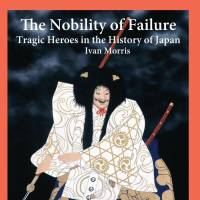Who hasn't at one time or another suspected that failure is nobler than success? Here the late British historian Ivan Morris celebrates Japanese heroes who refused to make the tawdry compromises success all too often demands. They fail, but fail gloriously, reaping the posthumous reward of deathless fame.
The Nobility of Failure, by Ivan Morris.
Kurodahan Press, Nonfiction.
Morris' portraits span the ages, from the semi-mythical Yamato Takeru of the fourth century to the inspired but doomed kamikaze pilots of World War II. In between are figures of near legendary status: sixth-century Yorozu; 12th-century Yoshitsune no Minamoto; 17th-century Amakusa Shiro, the "Japanese messiah"; 19th-century Saigo Takamori — warriors all, who died splendidly on the losing side. In other countries they'd have fallen into history's dust bin; in Japan, they, not those who vanquished them and survived to shape the future, became heroes of the popular imagination.
Yorozu fought for the native religion against foreign Buddhism — and lost. Yoshitsune, a brilliant fighter, aroused his more powerful brother's jealousy — and lost. The disastrous Christian peasant revolt led by Amakusa Shiro, all of 15 years old, was quashed so brutally Christianity didn't raise its head again in Japan for 250 years. Saigo Takamori championed the old samurai order against modern industrial values. He had no chance, and he knew it. He fought on, regardless.
Why the reverence accorded these losers? Morris explains: "In a predominantly conformist society ... rash, defiant, emotionally honest men like Yoshitsune and Takamori have a particular appeal." Undeniably.
Read archived reviews of Japanese classics at jtimes.jp/essential.


















With your current subscription plan you can comment on stories. However, before writing your first comment, please create a display name in the Profile section of your subscriber account page.